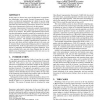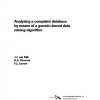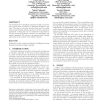138
click to vote
ICAIL
2009
ACM
14 years 12 months ago
2009
ACM
In this paper we discuss how recent developments in argumentation frameworks, most notably Extended Argumentation Frameworks, can inform the representation of a body of case law u...
118
click to vote
ICAIL
2009
ACM
15 years 6 months ago
2009
ACM
We propose an analysis of the codified Law of France as a structured system. Fifty two legal codes are selected on the basis of explicit legal criteria and considered as vertices ...
ICAIL
2009
ACM
15 years 6 months ago
2009
ACM
An overwhelming number of legal documents is available in digital form. However, most of the texts are usually only provided in a semi-structured form, i.e. the documents are stru...
ICAIL
2009
ACM
15 years 6 months ago
2009
ACM
109
click to vote
ICAIL
2009
ACM
15 years 8 months ago
2009
ACM
Throughout its history, AI researchers have alternatively seen their mission as producing computer behavior that is indistinguishable from that of humans or as providing computati...
130
Voted
ICAIL
2009
ACM
15 years 8 months ago
2009
ACM
ct Land use regulations are an important but often underrated legal domain. Especially in densely populated regions such as the Netherlands, spatial plans have a profound impact on...
189
click to vote
ICAIL
2009
ACM
15 years 8 months ago
2009
ACM
This paper describes a default-logic framework (plausibility schemas) and software tools (Decision ApprenticeTM and Legal ApprenticeTM ) for modeling, guiding and automating the r...
ICAIL
2009
ACM
15 years 8 months ago
2009
ACM
The development of graphical argument models is an active and growing area of research in Artificial Intelligence and Law. The aim is to develop models which may be readily used ...
102
click to vote
ICAIL
2009
ACM
15 years 8 months ago
2009
ACM
Legal doctrines provide principles, guidelines and rules for dispute resolution in reasoning with cases. To apply legal doctrines, the context of a contract consisting of differe...
135
Voted
ICAIL
2009
ACM
15 years 8 months ago
2009
ACM
In this paper coherence-based models are proposed as an alternative to logic-based BDI and argumentation models for the reasoning of normative agents. A model is provided for how t...



